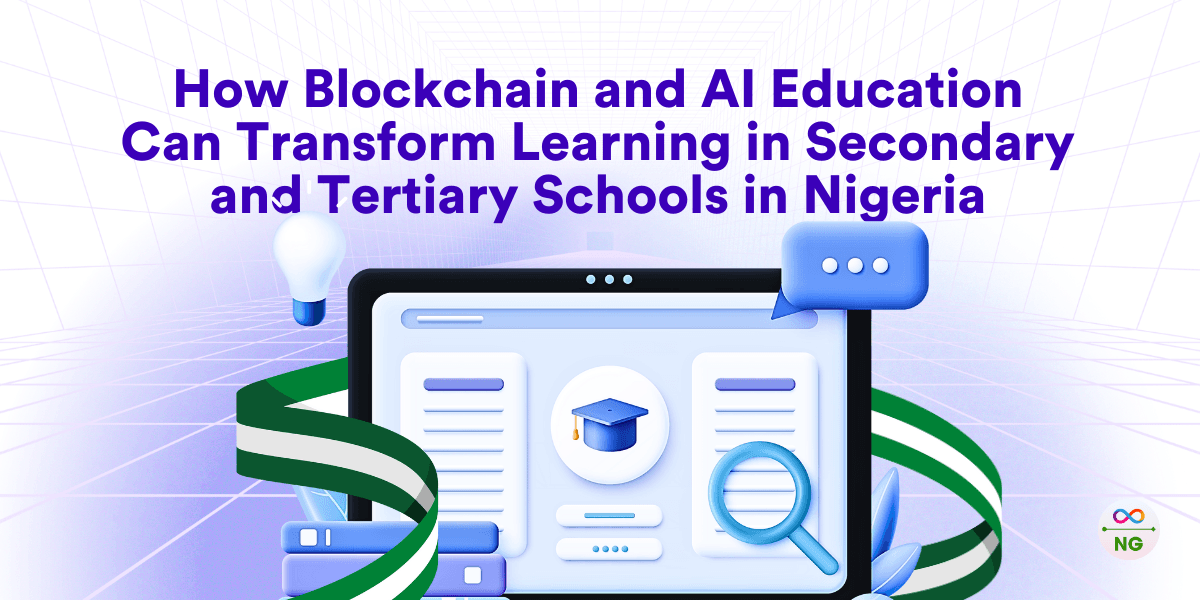Transform Learning in Secondary and Tertiary Schools in Nigeria Through Blockchain and AI
March 5, 2025

Nigeria is actively transforming its educational landscape through the integration of Blockchain and Artificial Intelligence (AI) technologies into its secondary and tertiary institutions. Notably, the Federal Government has initiated an Artificial Intelligence training program for 6,000 senior secondary school teachers across all 36 states and the Federal Capital Territory.
This initiative, spearheaded by the National Senior Secondary Education Commission (NSSEC), underscores a commitment to preparing students for a future dominated by technology. The goal is to equip educators with the necessary AI skills to enhance teaching methodologies.
This push for technological integration addresses persistent educational challenges, including resource limitations, infrastructure deficiencies, and administrative bottlenecks. Blockchain and AI offer powerful solutions to overcome these obstacles and revolutionize the learning experience.
Blockchain's Impact on Educational Integrity and Access
Academic integrity stands to gain significantly from Blockchain technology. It allows for the creation of tamper-proof, verifiable academic records, effectively eliminating certificate fraud. This enhances the credibility of Nigerian qualifications both domestically and internationally. Employers and educational institutions benefit from a streamlined verification process, saving time and resources. Furthermore, decentralized learning platforms have become feasible, enabling educators to share content directly with students and bypassing traditional bureaucratic hurdles.
This democratizes access to quality educational materials, particularly in underserved areas. The issuance of micro-credentials is also facilitated, encouraging lifelong learning and allowing students to tailor their education to meet market demands.
AI's Role in Personalized and Efficient Learning
Personalized education becomes a reality through AI-powered systems. These systems adapt to individual student learning paces and styles, delivering customized content and feedback. This approach enhances comprehension and retention, catering to the diverse learning needs of students. AI-driven smart tutoring systems provide 24/7 assistance, answering questions and offering supplementary resources.
This is particularly valuable for students in remote areas with limited access to qualified teachers. Routine administrative tasks, such as grading and attendance tracking, are automated, freeing up educators to focus on teaching and mentorship. This significantly reduces the administrative burden, allowing teachers to dedicate more time to student engagement and development.
Expanding STEM Education and Bridging the Skills Gap
Curriculum integration of Blockchain and AI enhances STEM education. Students gain practical experience with emerging technologies, preparing them for careers in fields like data science, cybersecurity, and software development. This contributes to Nigeria's digital economy.
As the demand for tech-savvy professionals grows, equipping students with these skills closes the existing skills gap, boosting employability and fostering entrepreneurship. Transparent and secure collaboration on research projects becomes possible through Blockchain, enabling students and educators to co-create knowledge and access global academic networks.
AI tools enhance data analysis and research efficiency, empowering students to contribute to scientific and technological advancements.
Addressing Challenges and Ensuring Sustainable Implementation
Successful integration requires addressing infrastructural limitations, digital literacy gaps, and funding constraints. A collaborative approach involving the government, private sector, and educational institutions is essential. Policies supporting digital education and partnerships with tech companies accelerate adoption.
Teacher training and capacity building ensure that educators can effectively integrate these technologies. Investment in reliable internet connectivity and digital tools is crucial for widespread implementation.
Dr. Maruf Olatunji Alausa, Nigeria’s Minister of Education, emphasizes the program's role in aligning the education sector with the global technological revolution. AI integration enhances learning experiences, personalizes education, and fosters critical thinking. The initiative, supported by a collaborative framework, prepares students for careers in the digital economy.
In this transformative journey, the Internet Computer Protocol (ICP) can play a significant role. Its decentralized and scalable architecture makes it well-suited for hosting blockchain-based educational platforms and applications.
ICP’s ability to handle large volumes of data and transactions ensures the smooth operation of digital certificate verification systems and decentralized learning platforms. Additionally, its smart contract capabilities can facilitate the creation of AI-powered educational tools and personalized learning experiences.
ICP's decentralized nature can contribute to the security and transparency of educational data, fostering trust and reliability in the system. Therefore, leveraging ICP's capabilities can accelerate Nigeria's efforts to revolutionize its education system, ensuring a future where students are equipped with the skills and knowledge needed to thrive in the digital age.
Article By: Mana Lamja